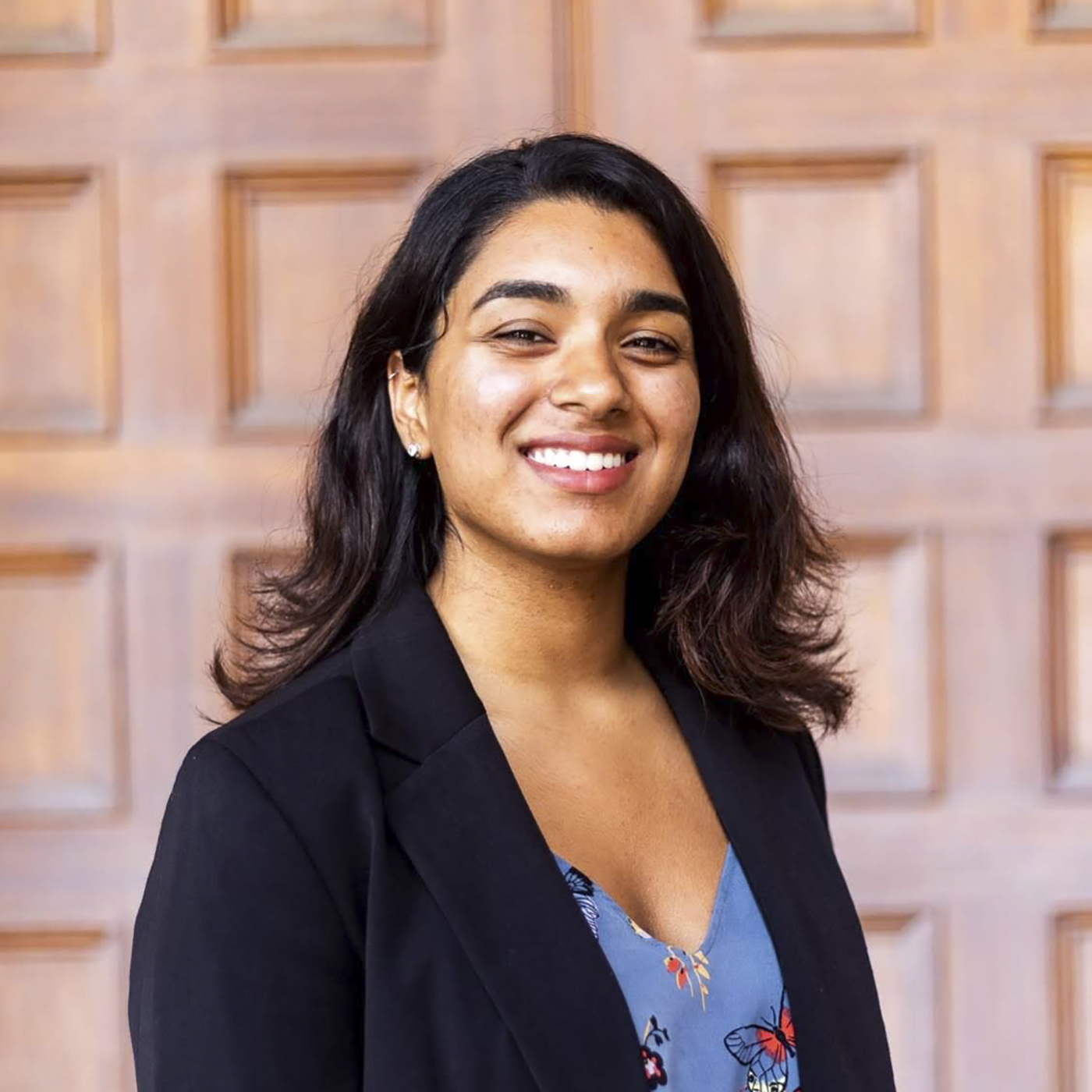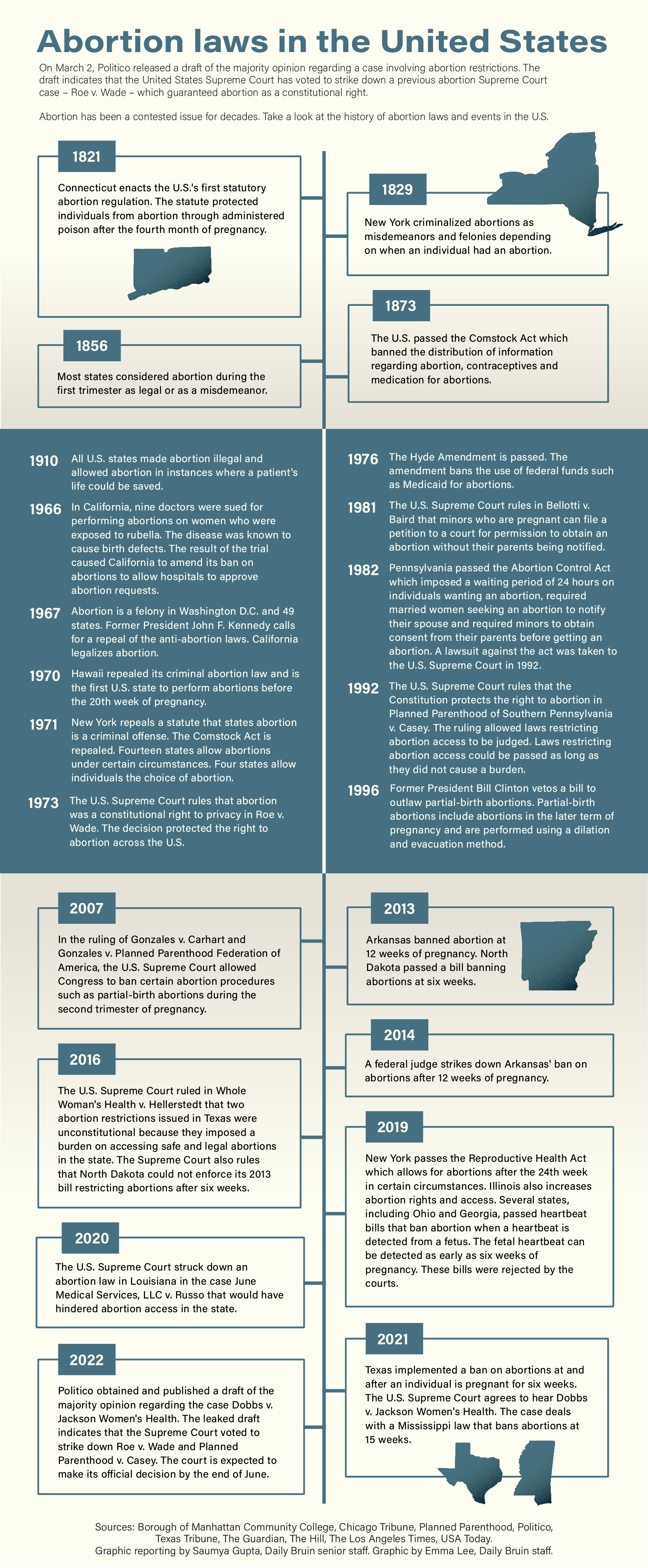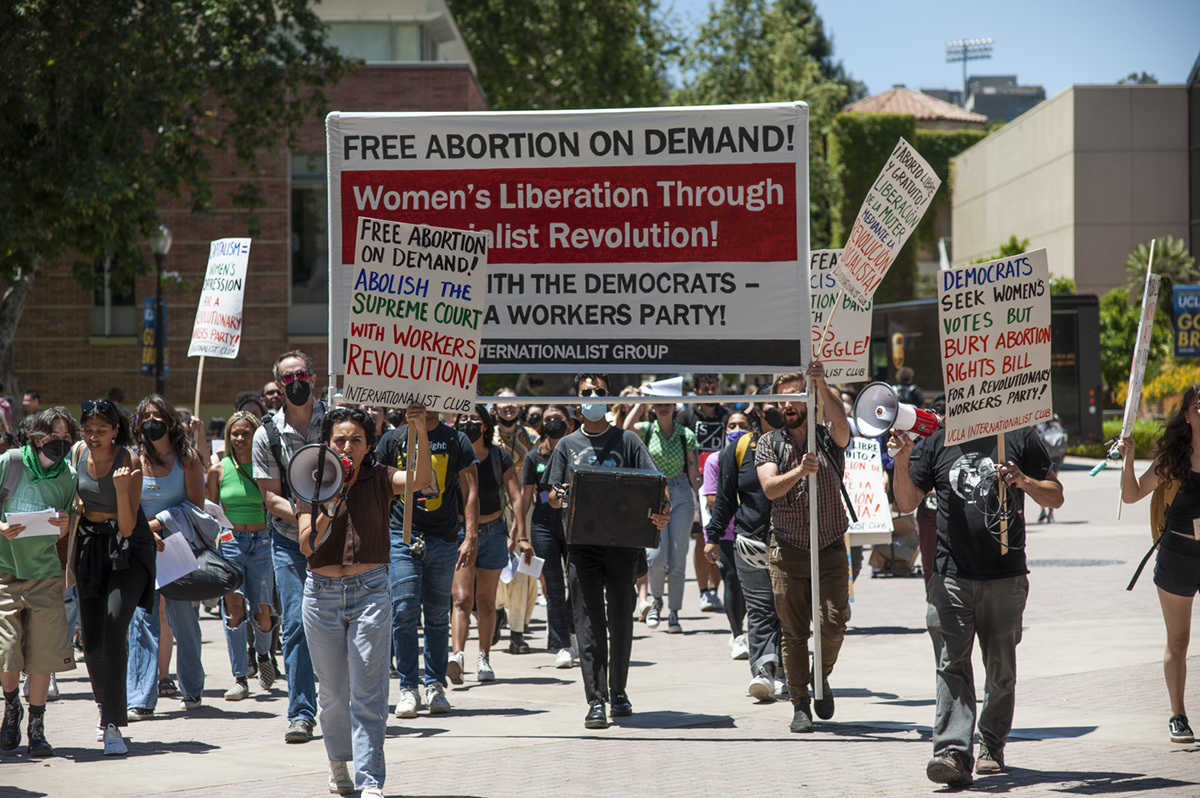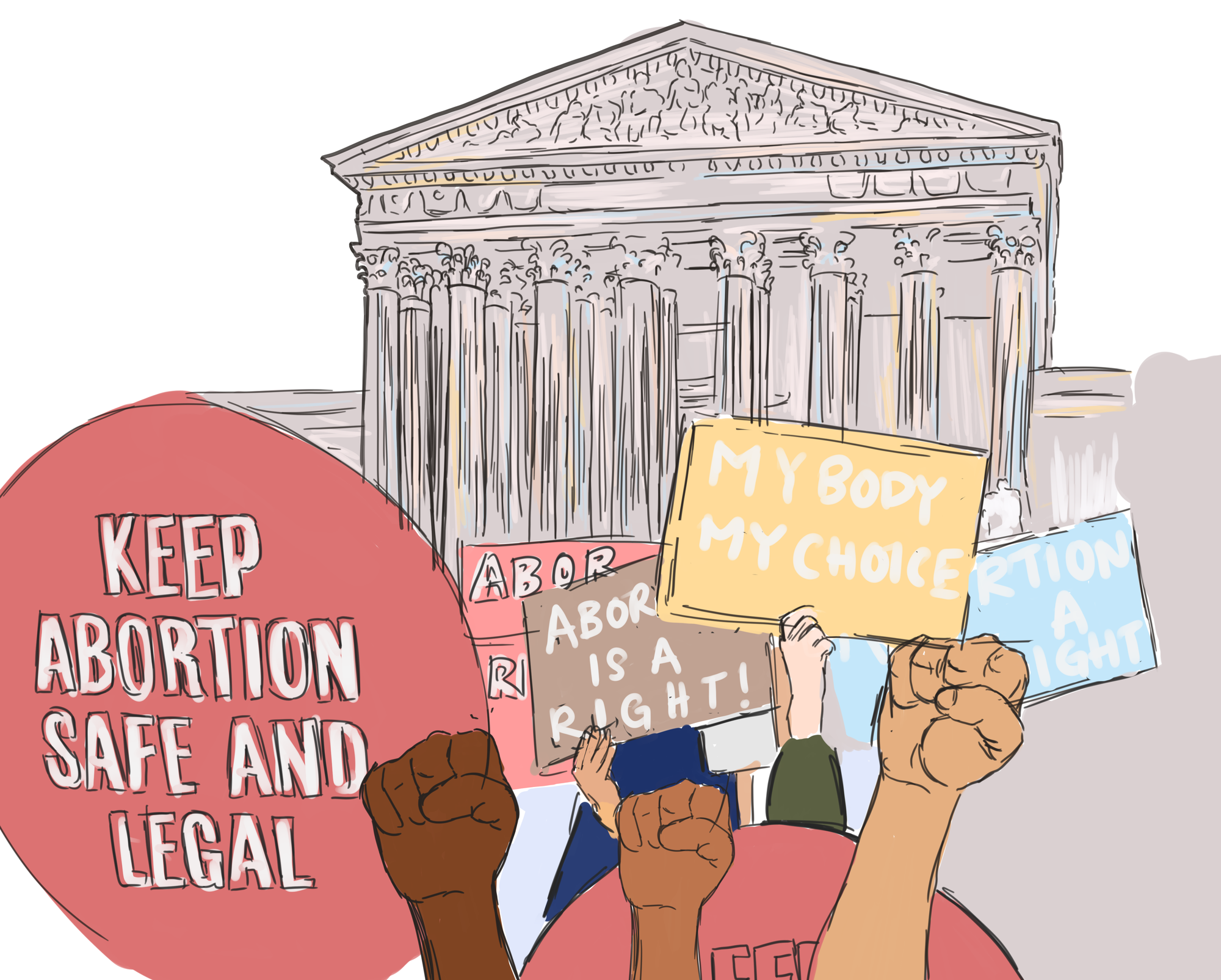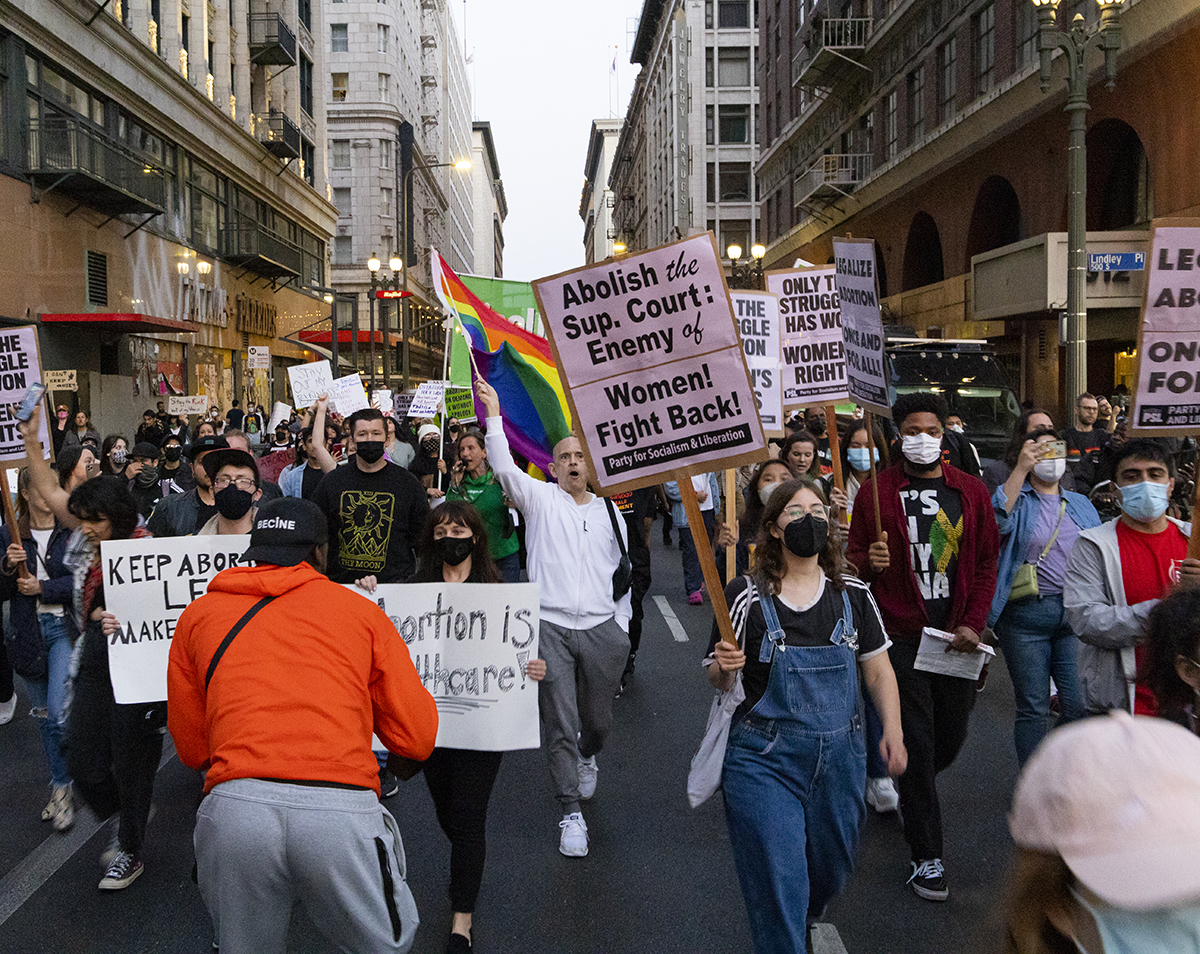Opinion: The fight for Roe v. Wade is a fight for basic social and legal protections
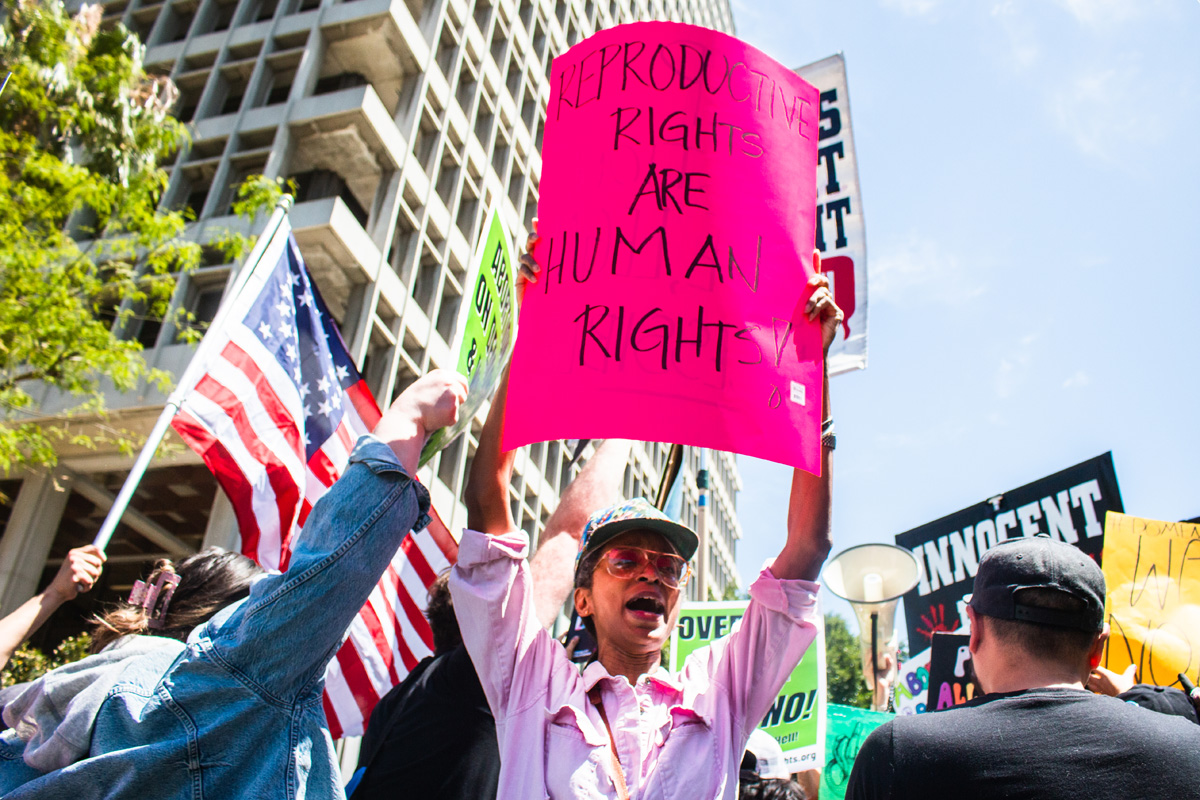
A protester holds up a pink sign that states, “Reproductive rights are human rights!” at a May 14 rally in downtown Los Angeles. The overturning of Roe v. Wade will have devastating consequences on childbearing people across the nation. (Christine Kao/Daily Bruin staff)
This post was updated May 30 at 9:36 p.m.
The fight never stops.
The basic right to bodily autonomy is once again under threat in the United States. In May, a leaked majority opinion draft revealed that the Supreme Court plans to overturn Roe v. Wade, which established the constitutional right to abortion.
If the Supreme Court decides to strike down the landmark 1973 ruling – which is very likely – there will be dangerous consequences for people across the nation.
The fundamental freedom of choice must be fiercely protected. The lives, rights and health of the people of this country are at stake.
Societal and health consequences
Restrictions on abortion access wouldn’t have the same effects on everyone.
In 2019, 38% of Americans who received an abortion were Black, 33% were white and 21% were Hispanic, according to the Kaiser Family Foundation. Especially in states that have already passed or are in the process of passing laws restricting abortion access, the overturning of Roe v. Wade will disproportionately impact people of color.
In Louisiana, where the legislature is set to vote on a bill that would charge anyone who gets an abortion with homicide, people of color make up 42% of the state’s population but 72% of abortion patients. In Texas, where it is illegal to abort a fetus after first signs of cardiac activity are detected, people of color comprise 59% of the state’s population but 74% of people who receive abortions.
Once the protections afforded by Roe v. Wade disappear, these states will likely make abortion at all trimesters illegal. While wealthy people can travel to states that allow abortions, those who do not have the money, time or ability to travel are faced with an impossible decision between an unwanted pregnancy and an illegal abortion.
Both choices come with their own set of risks that could be mitigated if abortion remains legal.
Besides the economic costs of raising a child, pregnancies can be dangerous, especially for Black women, who are three times more likely to pass away during or in the year after a pregnancy than white women, according to the Centers for Disease Control and Prevention. A 2021 study predicted that pregnancy-related deaths would increase by 7% in the first year of a total abortion ban and by 21% in following years because carrying a pregnancy to term is more deadly than receiving a legal induced abortion. Among Black women, the number of deaths are predicted to rise 33% in the years following a total ban, the greatest increase of any ethnicity or race, because of structural racism, the absence of quality health care and implicit bias among medical professionals.
On the other hand, illegal abortions may be performed in nonclinical settings by people who have neither the skills nor resources to safely carry out abortions. Unsafe abortions can result in blood loss, organ damage or poisoning and are a leading cause of death among childbearing people around the world, according to Doctors Without Borders.
Thus, protecting access to abortion is one of the most effective actions we can take to protect people with uteruses. History tells us as much. In the year after Roe v. Wade was decided, deaths from illegal abortions in the U.S. dropped by nearly 90%.
It is hard to believe this was simply a coincidence.
Clare Madera, a fourth-year geology student, said those who vilify abortion recipients don’t understand that the procedure is a byproduct of a system that chooses a reactive approach to unwanted pregnancies over a proactive one.
“In the grand scheme of things, abortion is really the last resort to an unwanted pregnancy,” Madera said. “It happens because of improper sex education, lack of resources, sexual assault. There’s so many things that happen that if people who are really pro-life want to stop abortion, they can start so much earlier.”
Adopting policies that can prevent unwanted pregnancies, such as sexual health education or access to birth control, would take time, assuming federal and state legislators are even willing to consider such measures. But in a political climate as polarized as ours, the likelihood of this occurring is slim.
Eroding comprehensive reproductive health care undermines the right to safety and to a life of our making.
“It (abortion) doesn’t just affect women or people with uteruses,” said Cianna Razo, a third-year global studies student. “It’s a human rights issue. It’s about privacy.”
Leaving abortion rights to the discretion of state governments will endanger the lives of those who do not have the good fortune of living in or traveling to an abortion-friendly state. What will result is a significant loss of choice as geography becomes more influential in determining health outcomes than the individual.
This country cannot claim to be a democratic state when its legislators and judges are so keen on robbing people of the right to choose what is best for their bodies. While one’s bodily autonomy must be balanced by the government’s obligation to promote public health, abortions do not put other people’s lives at risk – unlike actions such as refusing to wear a mask.
On the contrary, abortions protect our most vulnerable.
Access to abortion is a social matter as much as it is a health matter. Our lives are just as precious as the lives of future generations.
Legal implications
Politico reported that in the leaked opinion Justice Samuel Alito asserted the reasoning of Roe v. Wade was “exceptionally weak” and that the issue of abortion should be returned to our elected representatives.
This claim is not new.
Former Justice Ruth Bader Ginsburg was vocal in her disapproval of the court’s decision on the issue. As a pro-legal abortion scholar, Ginsburg believed the court’s broad ruling got in the way of political processes that would have eventually liberalized abortion and, consequently, fueled the backlash that launched the anti-abortion movement. Yet, despite Ginsburg’s reasoning, abortion was prohibited in 46 states at the time of the decision.
Justices, politicians and people with the power to make decisions over our lives have made the mistake of treating fundamental human rights as a legal and political debate.
The purpose of Roe v. Wade was to protect a right to bodily autonomy. It never should have been treated as the be-all and end-all.
Sapna Khatri, the Sears Clinical Law Teaching Fellow at the UCLA School of Law and the Williams Institute, said Roe v. Wade was never meant to serve as the bare minimum. Instead, it should have been expanded on and strengthened by the federal government.
“Roe was never meant to be the ceiling,” Khatri said. “What should have happened a long time ago is for that to then be further codified in federal law, so that there are additional protections for pregnant people across the country and we’re not stuck in this piecemeal situation where folks only have access depending on what state they live in.”
And now, instead of further protecting the rights of U.S. citizens, the Supreme Court is overturning a landmark decision that is the basis for other vital cases.
The implied right to privacy under the due process clause of the 14th Amendment is the basis for decisions such as Griswold v. Connecticut, which ruled that the government cannot restrict a married couple from buying and using contraceptives, Loving v. Virginia, which legalized interracial marriage, Lawrence v. Texas, which protects sexual privacy in one’s home, and Obergefell v. Hodges, which legalized same-sex marriage.
Under the guise of originalism, a belief that the Constitution should be interpreted based on its original meaning when it was enacted, conservative or traditionalist movements could come for these cases next, especially as the court has become increasingly politicized.
Roe v. Wade is a landmark decision with significant implications for bodily autonomy, human rights and the freedom of choice. Instead, politicians have used debates over morality and constitutional interpretation to hide political motivations and religious tyranny.
It’s difficult to predict the future. But the message of a decision like this is loud and clear: For marginalized groups, there is no peace. The court has and always will have the ability to give and take away rights as if it is a sinister game over legal philosophies and not as if there are lives at stake.
Looking ahead
The future is disheartening. When a group of unelected officials can walk back a right that the majority of Americans agree with, it is easy to feel hopeless.
However, now is not the time to accept what will come sitting down. It is the time to rise up and speak out.
Call the offices of the 51 senators who voted no on a bill that would have codified abortion rights. Protest as long as you can do so safely. Donate to abortion clinics. Build community power. Vote for legislators who are willing to protect universal access to abortion.
The assault on abortion rights may never stop, but neither will we.



